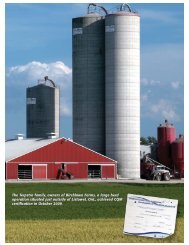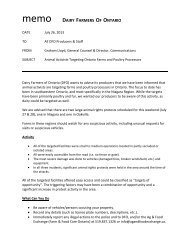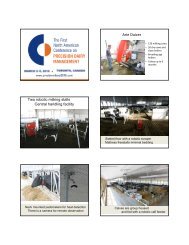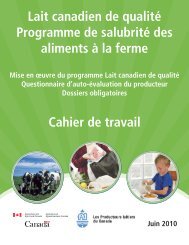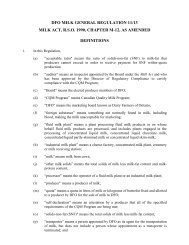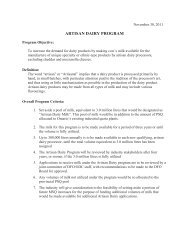Canadian Quality Milk On-Farm Food Safety Program - Centre ...
Canadian Quality Milk On-Farm Food Safety Program - Centre ...
Canadian Quality Milk On-Farm Food Safety Program - Centre ...
Create successful ePaper yourself
Turn your PDF publications into a flip-book with our unique Google optimized e-Paper software.
<strong>Canadian</strong> <strong>Quality</strong> <strong>Milk</strong><br />
• Motivation and job satisfaction for staff, because training and ongoing managerial<br />
support will help them meet new challenges.<br />
Even the best-planned program will not work unless hired help and family members<br />
understand the principles and practices of a HACCP-based system. Training helps staff<br />
learn:<br />
• Who does what.<br />
• What the:<br />
- Rules and policies are.<br />
- HACCP-based system is all about.<br />
- Standard operating procedures are.<br />
- Corrective action plans are.<br />
• When SOPs and preventative best management<br />
practices are to be implemented and records kept.<br />
• Why the HACCP-based system is important.<br />
• Where the CCPs are in the operation.<br />
• How to apply SOPs, corrective actions, etc.<br />
Hiring and retaining a workforce can always bring new challenges. Hiring workers who<br />
do not speak your language or who have a different cultural background can bring about<br />
a variety of new issues and demands. Some things to consider are:<br />
• Do not segregate staff who speak your language from those who do not. Staff<br />
morale will be better if you include all staff in training sessions and staff meetings<br />
– you may even find that during these sessions everyone learns new words and<br />
phrases from each other, which will improve every day communication.<br />
• Be prepared to have a translator or someone on staff who can speak both<br />
languages present during training sessions and staff meetings. The meetings<br />
may be slow at first, but, over time, the benefits will outweigh any delays.<br />
• Be aware that some cultures are more male-oriented and some workers may<br />
need time to adjust to having a female supervisor, or vice versa. Be prepared to<br />
give your staff time to adjust to you, as you will need time to adjust to them. Be<br />
patient and yet firm in your messaging.<br />
• If you hire a group of foreign workers, depending on the culture, the group may<br />
develop a class-system within itself. Understanding this group dynamic will help<br />
you spot and solve problems before they gain momentum.<br />
• Understand cultural needs and work with them, not against them. This will<br />
ensure things run more smoothly without any surprises, for example, some<br />
cultures require separate toilet facilities, while others may need time to<br />
accommodate religious needs. Knowing your “farm culture” and having a shared<br />
respect for these needs will ensure a happier, more successful workforce.<br />
June 2010 9—3




